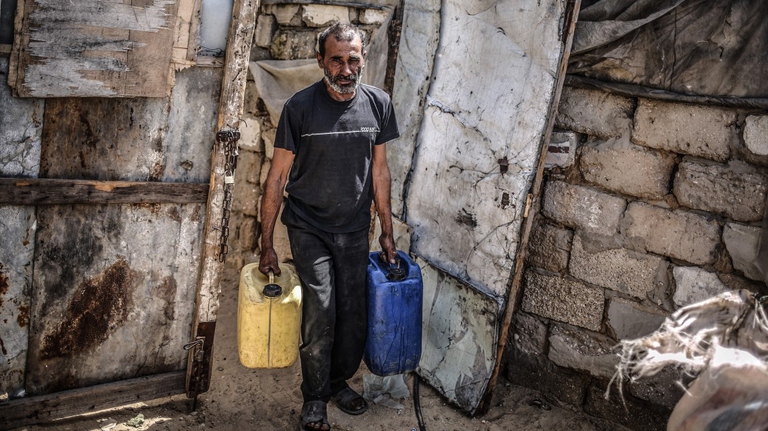
South African court dismisses a major lawsuit by 140,000 Zambian women and children against Anglo American for Kabwe lead poisoning. A setback for affected communities enduring the lasting impact of lead contamination.
“Water is life”. June Kunugi, UNICEF’s special representative to Palestine, reaffirmed it during the opening of the first water desalination plant in Gaza. Exactly while Israel decided to cut water supplies to West Bank, leaving tens of thousands of Palestinian people without water during the Islamic holy month of Ramadan. In the first
“Water is life”. June Kunugi, UNICEF’s special representative to Palestine, reaffirmed it during the opening of the first water desalination plant in Gaza. Exactly while Israel decided to cut water supplies to West Bank, leaving tens of thousands of Palestinian people without water during the Islamic holy month of Ramadan.
In the first two days of Ramadan, Mekorot, the only company charged by Israel with providing Palestinian cities with water, siphoned off water supplies to the city of Salfit, obliging its population to buy water bottles at exorbitant prices. Ayman Rabi, director of the Palestinian Hydrology Group – a Palestinian NGO whose aim is improving the access to safe drinking water – told the Arabic broadcaster Al Jazeera that people have been going through a water crisis for more than 40 years. “People are relying on purchasing water from water trucks or finding it from alternative sources such as springs and other filling points in their vicinity. Families are having to live on two, three or 10 litres per capita per day. We have made a broad reduction of the supply to all residents in the area”.
In the meantime, the authorities of the city of Jenin, a city of the West Bank with a population of more than 40,000 people, warned that Mekorot will be deemed the only “responsible for any tragedies resulting from water shortages during the hot summer months”, considering that in these areas temperatures exceed 35 degrees.
According to the United Nations the minimum quantity of water per capita per day is 7.5 litres. Israelis, settlers included, consume 350 litres of water per capita per day while Palestinians consume 60 litres on average. This amount of water doesn’t include drinking water: according to Johannes Hahn, Commissioner for European Neighbourhood Policy & Enlargement Negotiations, who participated in the opening of the water desalination plant, 95% of the water used by Palestinians would be “unsuitable for human consumption”.
Siamo anche su WhatsApp. Segui il canale ufficiale LifeGate per restare aggiornata, aggiornato sulle ultime notizie e sulle nostre attività.
![]()
Quest'opera è distribuita con Licenza Creative Commons Attribuzione - Non commerciale - Non opere derivate 4.0 Internazionale.
South African court dismisses a major lawsuit by 140,000 Zambian women and children against Anglo American for Kabwe lead poisoning. A setback for affected communities enduring the lasting impact of lead contamination.
Controversial African land deals by Blue Carbon face skepticism regarding their environmental impact and doubts about the company’s track record, raising concerns about potential divergence from authentic environmental initiatives.
Majuli, the world’s largest river island in Assam State of India is quickly disappearing into the Brahmaputra river due to soil erosion.
Food imported into the EU aren’t subject to the same production standards as European food. The introduction of mirror clauses would ensure reciprocity while also encouraging the agroecological transition.
Sikkim is a hilly State in north-east India. Surrounded by villages that attracts outsiders thanks to its soothing calmness and natural beauty.
Sikkim, one of the smallest states in India has made it mandatory for new mothers to plant saplings and protect them like their children to save environment
Chilekwa Mumba is a Zambian is an environmental activist and community organizer. He is known for having organized a successful lawsuit against UK-based mining companies.
What led to the Fukushima water release, and what are the impacts of one of the most controversial decisions of the post-nuclear disaster clean-up effort?
Nzambi Matee is a Kenyan engineer who produces sustainable low-cost construction materials made of recycled plastic waste with the aim of addressing plastic pollution and affordable housing.









